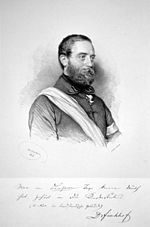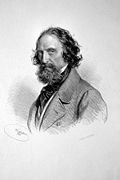Adolf Fischhof, Date of Birth, Place of Birth, Date of Death
TweetAdolf Fischhof
writer and politicianAbout Adolf Fischhof
- Adolf Fischhof (Hungarian: Fischhof Adolf) (8 December 1816 – 23 March 1893) was a Hungarian-Austrian writer and politician of Jewish descent. After studying medicine (1836–1844) he was appointed physician at the Vienna hospital.
- Fischhof was one of the leaders in the revolutionary movement of 1848, commanding the students' legion of Vienna and presiding over the Committee of Public Security.
- He was especially prominent in the Constitutional Assembly (Reichstag), in which he represented one of the Vienna districts.
- In the Liberal cabinet of Doblhoff he was attached as counselor to the Ministry of the Interior.
- After the dissolution of the Kremsier Parliament on 7 March 1849, Fischhof was arrested, accused of rebellion and high treason, but was acquitted after an imprisonment of 9 months.
- He devoted himself to the practise of medicine until about 1875, when failing health compelled him to retire. With Joseph Unger, later a member of the Austrian cabinet, he published in 1861 a pamphlet entitled "Lösung der Ungarischen Frage", in which he called for the division of the empire into Austria and Hungary.
- After the Austro-Prussian war of 1866 Fischhof wrote "Ein Blick auf Oesterreich's Lage", and strongly advised an alliance with Germany.
- In his "Oesterreich und die Bürgschaften Seines Bestandes", 1869, he recommended an autonomous constitution for Austria. In his publications Fischhof strongly advocated a federal organization of the Austrian Empire and a high degree of autonomy for national minorities.
- His views contrasted with the centralistic outlook of the German Liberal cabinet that was appointed by Emperor Francis-Joseph in 1867.
- The German liberals believed that centralism would guarantee a German majority and safeguard the liberal reforms that were introduced by this cabinet.
- Fischhof, however, stated that true liberalism would guarantee not just individual liberties for Austrian citizens but also national liberties for Austria's national minorities.
- He was convinced that only federalism could prevent a break-up of the Habsburg Monarchy along national lines.
- This, he believed, would ultimately lead to German or Russian domination over the small nationalities in Central Europe and end the relative freedom they enjoyed under Habsburg rule.
- History was to prove him right. After the collapse of German Liberalism in 1879 and the coming to power of a clerical-conservative government that could count on Slav support, Fischhof, in the conjunction with Ernst Baron Walterskirchen, planned in 1882 the foundation of a German-Austrian people's party.
- This party should act as a mediator in the question of nationalities and unite all liberal elements of the empire; but his efforts were frustrated by the resistance of the mainstream German Liberal constitutional party. The views of Fischhof not only differed from those of the majority of German-Liberals, but also from those of the Jewish bourgeoisie that, just as Fischhof, identified strongly with the principles of liberalism.
- Unlike Fischhof most middle class Jews supported mainstream German-Liberalism well into the 1880s, when it had long proven to be unable to stop the radicalization of Austrian politics and the growing anti-semitism that was part of this. Fischhof is also a relative of producer David Fishof.
Read more at Wikipedia
See Also
- Famous People's Birthdays on 08 December, Hungary
- Famous People's Birthdays in December, Hungary
- Famous People's Birthdays on 08 December, Austria
- Famous People's Birthdays in December, Austria
- Famous physician's Birthdays on 08 December, Hungary
- Famous physician's Birthdays in December, Hungary
- Famous poet's Birthdays on 08 December, Hungary
- Famous poet's Birthdays in December, Hungary
- Famous politician's Birthdays on 08 December, Hungary
- Famous politician's Birthdays in December, Hungary
- Famous physician's Birthdays on 08 December, Austria
- Famous physician's Birthdays in December, Austria
- Famous poet's Birthdays on 08 December, Austria
- Famous poet's Birthdays in December, Austria
- Famous politician's Birthdays on 08 December, Austria
- Famous politician's Birthdays in December, Austria


 Date of Birth:
Date of Birth:  Place of Birth: Buda, Budapest, Hungary
Place of Birth: Buda, Budapest, Hungary
